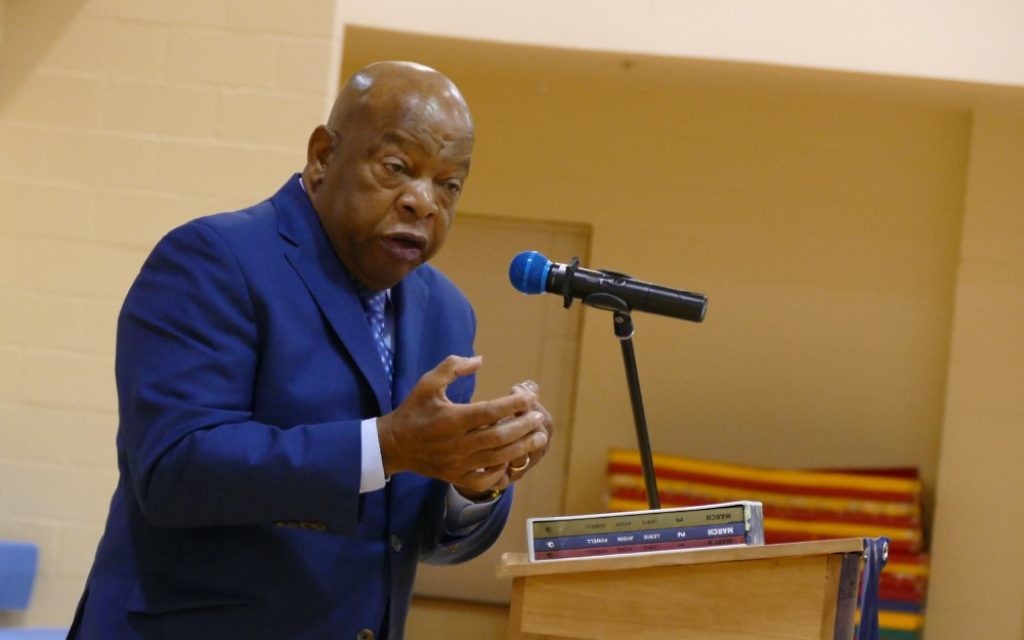John Lewis Cites Urge to Get Into Good Trouble
When John Lewis was a child, he learned to read a Bible and decided he wanted to be a pastor someday.
So the man who grew up to be an impassioned orator during the civil rights movement and in Congress and is the last surviving speaker from the 1963 March on Washington got his first practice in public speaking as the impromptu minister for a congregation of chickens he cared for on his family’s farm in rural Alabama.
Some of the chickens bowed their heads, and others shook their heads, Lewis said.
Get The AJT Newsletter by email and never miss our top stories Free Sign Up

“They never would quite say amen,” he said, though he speculated that they listened better than some of his colleagues in Congress.
Those chickens couldn’t have been a more attentive audience than the diverse crowd of hundreds packed into the Davis Academy Lower School gym to hear Lewis talk about his life and his award-winning graphic memoir series, “March,” Monday night, Nov. 28.
The better audience fit one of Lewis’ themes: No matter what politicians or protesters might say, today’s United States, where a black man could be elected president and a woman could win the popular vote for that office, is a better place than the segregated America where he grew up.
“Our country is a better country, and we are a better people, and don’t let anyone tell you different,” Lewis said.
For example, in 1956, inspired by Rosa Parks and Martin Luther King Jr., a 16-year-old Lewis sought a library card in Troy, Ala., only to be told that “the library was for whites only.” But a 58-year-old Lewis returned to that library for the first time in 1998 to sign copies of the first book of “March” and was given a library card.
In introducing Lewis, Davis Associate Head of School Drew Frank, the son of the congressman’s longtime friend Sherry Frank, recalled working hard at age 10 to get Lewis elected to Congress for the first time. But he was disappointed when Lewis chose to walk to his victory celebration rather than ride in the waiting limousines.
“John never stops marching,” Frank said.
Lewis urged the young people in the audience to take up the march through nonviolent civil disobedience for social justice — with an added reminder for the youngest to listen to their parents and teachers and do their homework.
“Get into trouble, good trouble, necessary trouble,” he said.
The United States can serve as the world’s model for justice and equality, Lewis said, “but we have to get it right.”
He echoed Pirkei Avot (Ethics of the Fathers) in explaining that we should try to solve problems such as global poverty and climate change even if the work won’t be completed in our lifetimes, just as people in such movements as civil rights, women’s rights and LGBTQ rights sacrificed themselves through the years as down payments for their causes.
“We all have an obligation to leave this little piece of real estate a little cleaner, a little greener and a little more peaceful,” Lewis said.
In a brief meeting with reporters after the public event, he spoke of some ways he hopes the federal government can meet that obligation:
- Enact legislation addressing gun violence instead of just talking about it. “We’re losing just too many people. There’s too many guns. It’s sad.”
- Spend more on education to “see that all of our children receive the best possible education. If not, the rest of the world is going to pass us by.”
- Fix the Voting Rights Act, whose requirement for certain states to get preapproval for changes was thrown out by the Supreme Court in 2015. “If the majority party would bring us a piece of legislation to fix it, we would pass it.”
- Follow through on Donald Trump’s talk of heavy spending on infrastructure repairs and improvements. “I think he would have a tremendous amount of support from the Democratic members, rank and file, and from the Republicans.”





comments